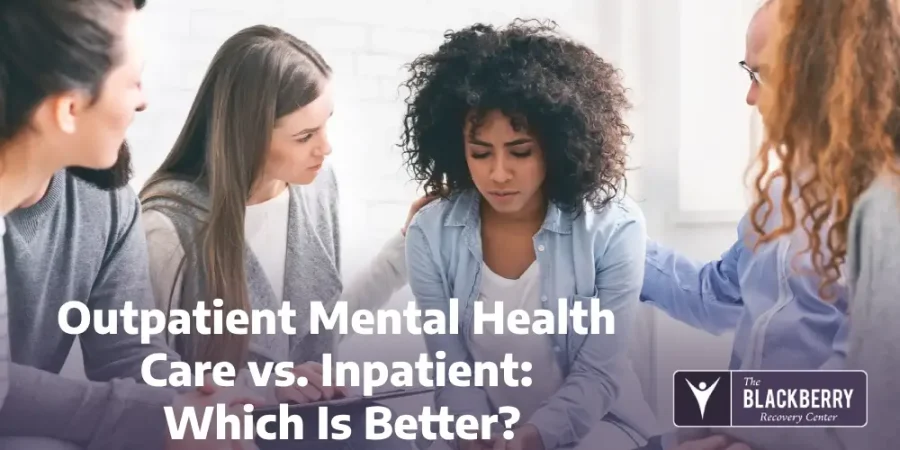When you’re looking for mental health care, it’s easy to feel overwhelmed by choice. In particular, many people struggle with identifying what type of treatment they need. And unfortunately, when people aren’t sure of how to get help, they sometimes end up skipping treatment altogether. That’s why it’s so important to understand the differences between outpatient mental health treatment and inpatient options.
To help you make the right choice for your mental wellbeing, we’re explaining who inpatient and outpatient mental health care is for, as well as what you can expect from your mental health program. Keep reading to learn more about inpatient and outpatient behavioral health services in St. Cloud, Florida!
Who Needs Mental Health Care?

Who Needs Mental Health Care?
Before we delve into outpatient mental health treatments vs inpatients, we must first establish how to tell when mental health becomes a problem. Part of what makes this so murky is that many “negative” emotions are completely normal. Everyone feels sad or angry at times, so how do you know when these feelings become a mental health issue?
The diagnosing criteria for mental illness varies by the condition, but there are certain signs to watch out for. These warning signs of mental illness include:
- Losing interest in activities that you used to enjoy
- Feeling confused or having trouble concentrating
- Having excessive worry, especially if there are physical symptoms like racing heartbeat or issues with digestion
- Trouble sleeping, whether that’s falling asleep, staying asleep, or waking up
- Persistent feelings of sadness or guilt
- Thoughts of suicide or self-harm
More than anything, one of the biggest warning signs of a mental health condition is having trouble completing daily activities. This could mean feeling too lethargic to go to work, or too anxious to go to the grocery store. If something in your mental state is stopping you from completing what used to be simple tasks, then there’s a good chance that you’re dealing with a mental health issue.
So how do you get help? There are many types of psychiatric care, and none of them are “better” than others. So when it comes to inpatient vs outpatient mental health treatment options, the decision ultimately comes down to what’s right for you.
Outpatient Mental Health Treatment Programs

Outpatient Mental Health Treatment Programs
As the name suggests, outpatient behavioral health care is conducted in such a way that you can live at home and attend mental health treatment part-time. At The Blackberry Center near Orlando, Florida, our partial hospitalization program provides treatment for five and a half hours every day, Monday through Friday. In this way, outpatient mental health care allows you to continue working or attending school while dedicating time to improving your mental health care.
There are also certain mental health conditions that are better suited for outpatient mental health services. For example, someone who has a plan to commit suicide would likely be better served by an inpatient mental health program or crisis care services. On the other hand, someone suffering from mild to moderate depression or anxiety may not need 24/7 supervision, and thus outpatient behavioral health care would be a better fit for them.
When selecting an outpatient mental health clinic, it’s also important to consider any co-occurring disorders. For example, someone living with moderate anxiety might rely on drugs or alcohol to manage their symptoms. In cases like this, addiction is a clear and present danger, and the longer this behavior goes on, the more dangerous it becomes.
As you can imagine, treating both a mental illness and a co-occurring substance use disorder can be challenging, and not every behavioral health center is equipped to deal with that. But at The Blackberry Center of St. Cloud, Florida, we offer dual diagnosis outpatient treatment that addresses both addiction and substance abuse. So if you find yourself dealing with a moderate mental health issue and a co-occurring substance abuse problem, then our outpatient mental health and addiction services are for you.
Inpatient Mental Health Treatment Programs
As opposed to outpatient mental health treatment, inpatient options are designed for those who are in need of 24/7 care. For this reason, they are typically recommended for people who are experiencing extreme mental distress. Some of these more severe mental illness symptoms include:
- Inability to tell reality from hallucinations or delusions
- Physical health issues without a clear cause (e.g., migraines, aches and pains)
- Persistent thoughts of suicide or self-harm
- Trouble breathing when experiencing stress
- Difficulties understanding friends and family
If you present with these or any other severe mental illness symptoms, an inpatient program could be right for you. Inpatient behavioral health services center provide a place to focus solely on your recovery, without outside distractions. This makes it ideal for people who are able to take time away from work and other obligations to work on their mental health. However, for people who may need to continue work or school, outpatient mental health care may be a better option.
Finding Help at a Florida Behavioral Health Center
Ultimately, whether inpatient or outpatient mental health care is right for you comes down to your unique situation. And it’s alright if you’re not sure which program is best for you. Our friendly admissions specialists are waiting to talk to you about what type of psychiatric care works best for you; call them at (813) 908-4199 or fill out a confidential contact form.
Whether it’s time for outpatient mental health care or inpatient, we want to help you get back in control of your life. Mental illness can feel overwhelming, but our St. Cloud, Florida mental health center is ready to help you.
FAQ
- What is the difference between outpatient and inpatient mental health care?
Outpatient care allows patients to live at home while attending therapy or treatment, while inpatient care requires patients to stay in a hospital or treatment facility. - Which option is better for someone with severe mental health issues?
Inpatient care is typically recommended for individuals with severe symptoms requiring constant monitoring, while outpatient care suits those with more manageable conditions. - Can outpatient care be effective for long-term treatment?
Yes, outpatient care can be highly effective when combined with therapy and medication, especially for ongoing support after inpatient treatment. - What are the cost differences between outpatient and inpatient care?
Outpatient care tends to be less expensive as it doesn’t involve overnight stays or facility fees. - Is inpatient care better for people with a history of relapse?
Inpatient care provides more structure and supervision, making it a better option for individuals with a history of relapse or those who need intensive support.






